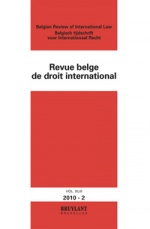Negotiating International Public Policy through the Adoption and Contestation of Sanctions
Article published in the RBDI, 2017/2, special issue "Public policy meets property protection", Tom Ruys and Diederiek Bruloot (eds)
Sanctions are commonly understood as a means to enforce international law in the global order. In legal doctrine, the focus is generally on these measures’ coercive purpose. Nevertheless, sanctions can serve other policy objectives. Of particular relevance for the international legal order is a sanction’s stigmatization function. In this case, states and regional, or international, organizations adopt sanctions in reaction to behaviour that breaches an international norm in order to signal their commitment to that norm and to stigmatize the alleged wrongdoer as a deviant. Because processes of stigmatization help distinguish accepted behaviour from rejected behaviour, they contribute to the formation of the international legal order. Importantly, targeted states do not simply accept their status as deviants. Rather, they align with groups of states that contest the adoption of unilateral coercive measures. They respond to stigmatization by affirming the norms that constitute their version of the international legal order. The practices of justifying and contesting sanctions thus reveal the tug of war between different groups of states that seek to determine the norms that lie at the foundation of the international legal order and how they should be enforced.

